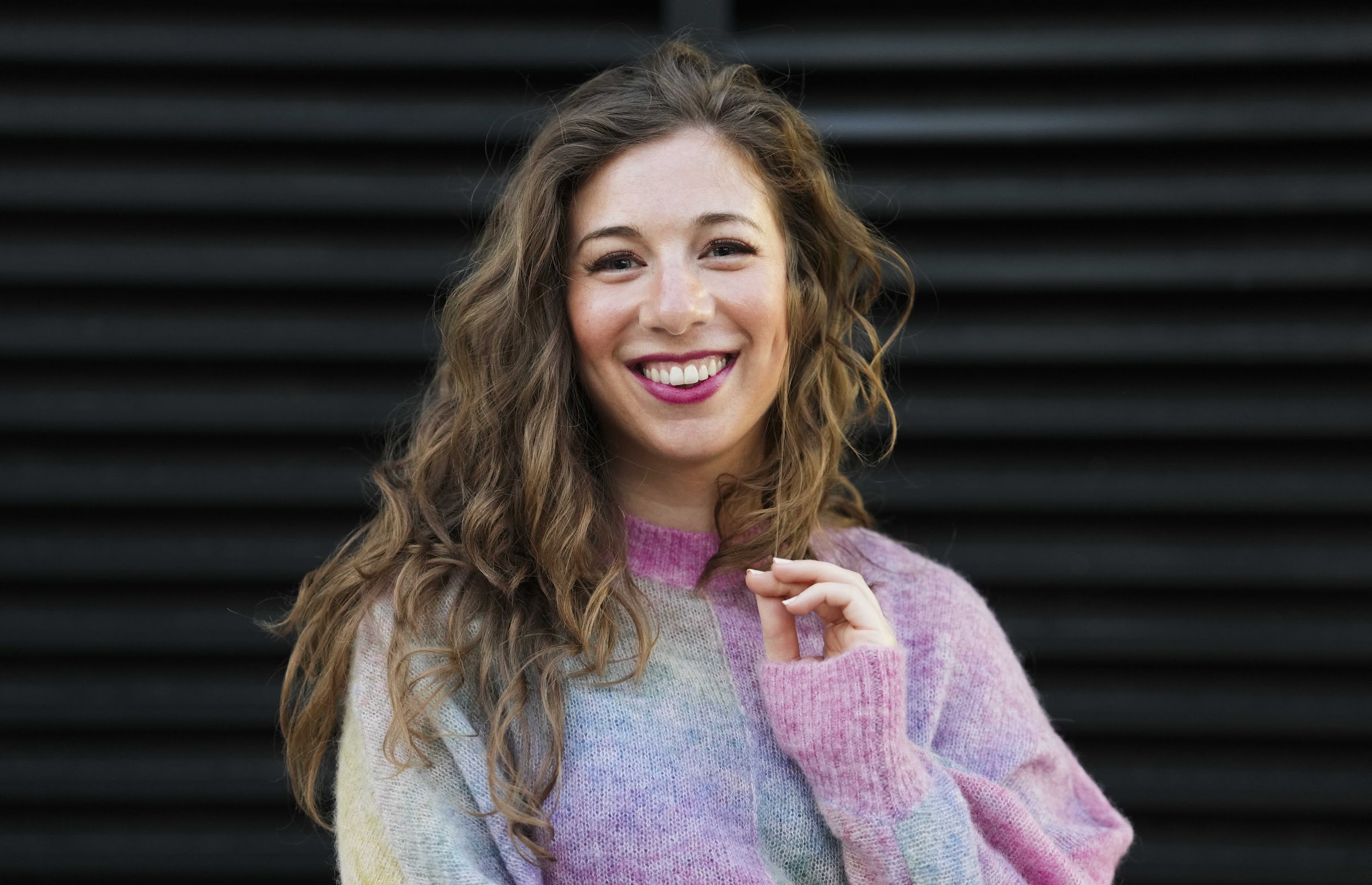Almost Famous
You’ve definitely seen her megahit TV shows, but you’ve probably never heard of her. Betsy Beers—half of the Shondaland dream team and the woman whose work brings 'Bridgerton' to life—is one of the most influential producers in Hollywood. And she’s ready for everyone to know it.
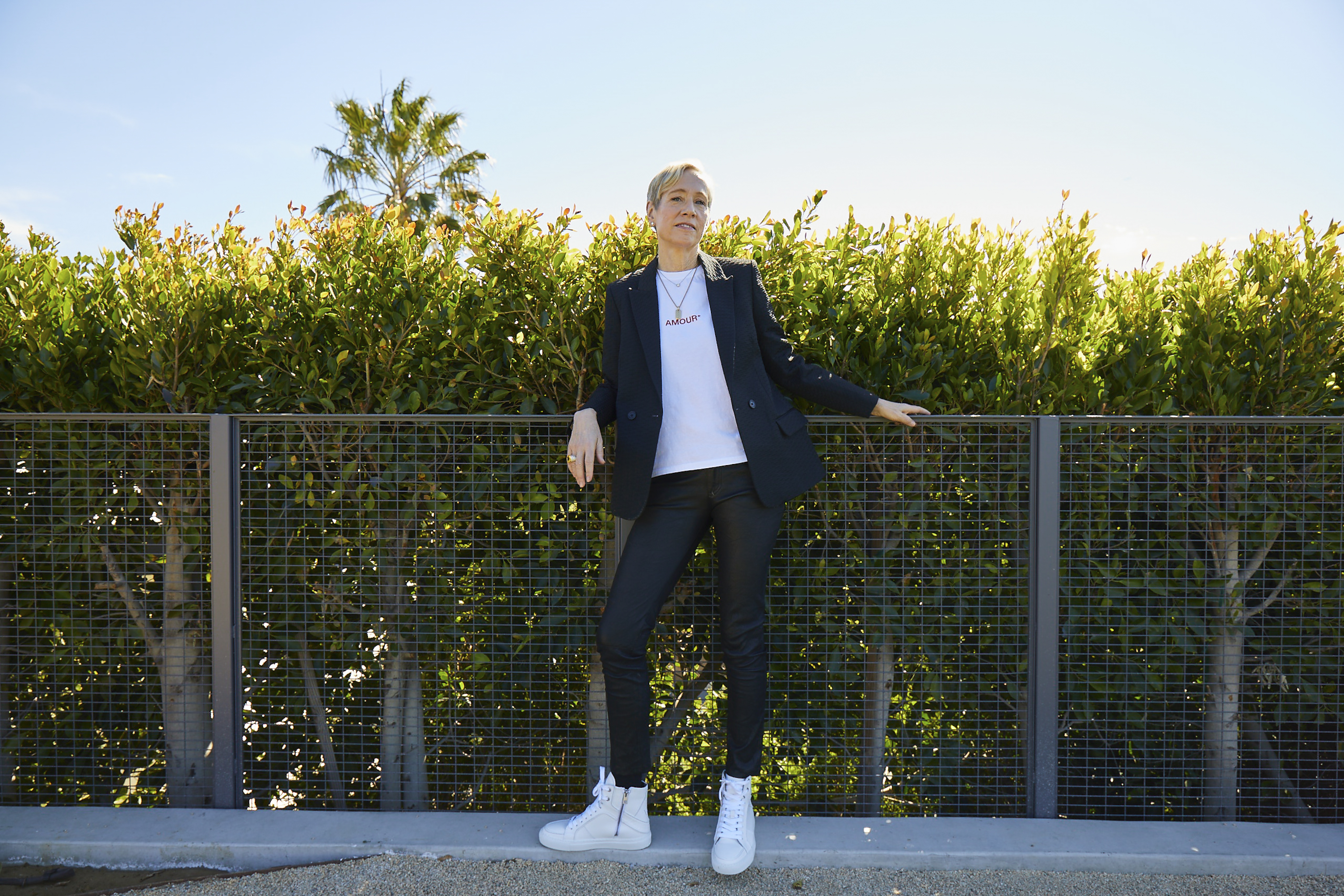

Dearest readers, the time has come for another season—of Bridgerton. In honor of the highly anticipated return of the Regency-era romp, we’re digging up all the sex, scandals, and secrets of the Netflix show. Sorry Lady Whistledown, Marie Claire’s “Bridgerton Week” is about to be the hottest read in town.
You probably know all the hallmarks of a Shonda Rhimes show: a dishy drama with a sprawling, diverse cast of quick-talking, improbably-attractive people, often featuring tormented lovers who can’t be together, for reasons (she’s his intern; he’s the president; their courtship is an elaborate ruse). But quite possibly you are unaware that every Shonda Rhimes show is also, crucially, a Betsy Beers production.
Beers is not the woman behind the woman. She’s more like the woman beside the woman: the only trusted confidant to whom Rhimes will read a rough draft or float an early idea; the talent-spotter who puts together the crew and helps cast a show; the preserver of a piece’s integrity in the face of nonsensical network notes; the visionary who has what Rhimes describes as “an amazing, uncanny, beautiful ability to translate a story into music”—quite literally in the case of Bridgerton, because those instrumental, classical-style covers of current pop songs were all Beers’s idea; the protector of everybody’s safety and sanity in the not-unprecedented event that a Shondaland series becomes a cultural phenomenon and all involved parties are suddenly, extremely famous.
Well, almost all involved parties. It is one of the great ironies of Rhimes’s and Beers’s friendship that Rhimes, who is exceptionally shy, is the public face of everything they do, and Beers, who is totally at ease performing, is the one the spotlight rarely finds. “I welcome attention,” Beers says. “And partially, I welcome attention because one of the hardest things about this job is a lot of people don’t know this job exists.”
Beers, Rhimes’s producing partner of almost 20 years, basically does everything but writing. It’s a very give-me-the-burger-hold-the-patty situation. Rhimes puts it this way: “I write the stories. That is what I do. But creating a show and running a show is ten thousand other things than that.” The person who does the ten thousand other things is Beers. “There’s no way I could do what I do if Betsy didn’t do what she does.”
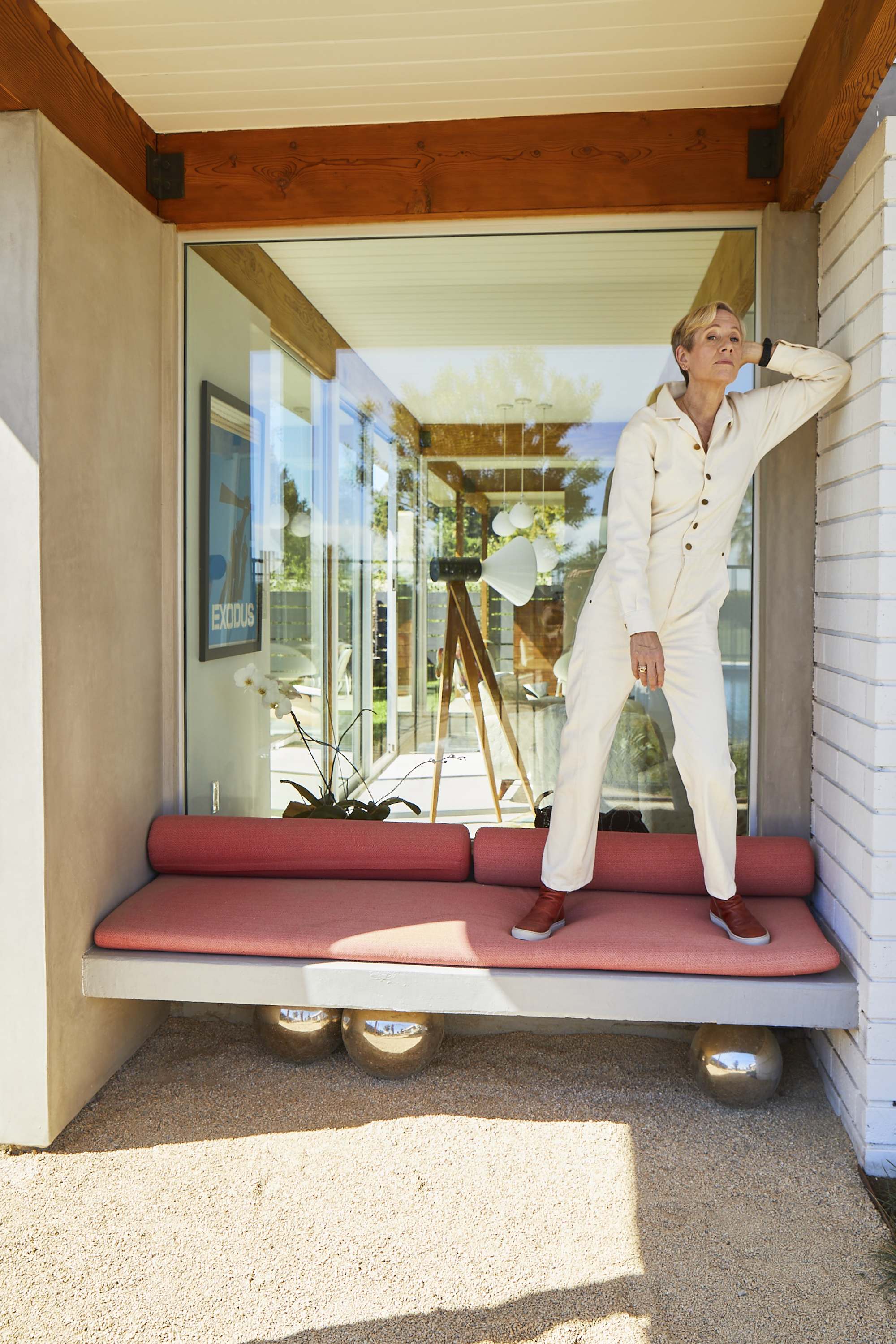
Beers at her home in Los Angeles. "I welcome attention."
As Beers, 64, and I speak over Zoom, I see different nooks of the Los Angeles home she shares with her husband of 13 years, Bruce, a criminal defense attorney (who consulted on Shondaland series Scandal and How to Get Away With Murder). She warns me that she may need to float around to avoid ongoing construction, but she seems to be enjoying the dissonance between the reason for our interview—that she is essentially the Max Martin of TV, a hit machine who is producing one of Netflix’s most successful series ever—and her present circumstances, where at any moment our conversation could be interrupted by “the backup truck of the people who empty out the porta potties,” she says. “Really glamorous.”
It's two weeks after Inventing Anna dropped on Netflix, audio clips of Julia Garner’s part-real-Russian-part-fake-German accented voice flooding TikTok, and anticipation for the second season of Bridgerton building (out March 25) to a climax. (Sorry.) For an exceptionally busy person in the midst of a high-octane month, Beers is as engaged and relaxed as can be, chatting like someone with no other demands on her time.
Get exclusive access to fashion and beauty trends, hot-off-the-press celebrity news, and more.
Each Bridgerton installment centers on a different sibling. This time, it’s Anthony (Jonathan Bailey) making his moves in the marriage market, angling for perfect-on-paper Edwina Sharma (Charithra Chandran) in spite of his obvious, crackling attraction to her defiant older sister, Kate (Simone Ashley). While season one was about “the pure awakening of [Phoebe Dynevor’s Daphne], who knows nothing,” Beers says, Anthony is far more experienced than his sister was, taking the series in a new direction. “He's a man of the world, but he's surprised by his own confusion and torture…and how he keeps fighting feelings with duty."
Behind the scenes of Bridgerton, Beers voices the most salacious part of the story: She does the stage directions during table reads. Among Shondaland casts, she is famous for doing so with such energy and alacrity that to attempt a read without her feels flat and off-key. “The joke started to be, ‘How terrifyingly graphic can we make certain stage directions so we can watch her read them?’ ” says Beers. Sometimes there are lyrics she is called upon to sing.
Beers doesn’t strike me as somebody who blushes easily. But—how very like a Bridgerton—she insists there are things she just won’t say. “A lady has limits.”
Beers grew up on the North Shore of Long Island and began her life in the entertainment industry as a performer, self-sorting into comedy, she says, because “I wasn’t a very good dramatic actor, and nobody took me seriously.” In New York she ran a comedy sketch and pop group with some friends. “What I realize now is I was producing the shows. I liked moving the pieces around. I liked the idea that I was helping develop a world.”
She moved to Los Angeles and got a job reading scripts, which in some ways was a natural fit (she’d majored in drama and English at Williams College) and in other ways was not (she didn’t know how to type). Then she became a junior executive on the Keenan Ivory Wayans movie, I'm Gonna Git You Sucka. Along the way, Beers figured out she needed to let go of her acting dream—a hard truth to face. “It was the only thing I thought I wanted to do,” she recalls; her father, who’d died when she was young, was an agent, and pursuing acting felt like “a connection to my dad.”
Beers was startled at how swiftly development and production came to feel “instinctively so natural to me.” As an actor, she’d constantly run into problems because “I could always see the other person’s point of view.” Rather than advocating for her own character, she’d find herself empathizing with everyone in the scene, diluting her performance in the process. She struggled, too, with the “passivity” of acting, of “always waiting for the phone to ring.” In production, she felt like she could exhale, like she’d found the thing she was built to do.
Another sign that she was on the right track: She kept getting promoted. And we’re talking about the mid-1990s—Hollywood’s peak Weinstein years. “I would say that it was definitely male-dominated, as it pretty much continues to be,” Beers says, adding that she lucked out: Her early mentors were women, including Ruth Vitale, who brought her to Paramount, “made up a title for me that didn’t even exist,” and let Beers pull from a discretionary fund to option material.
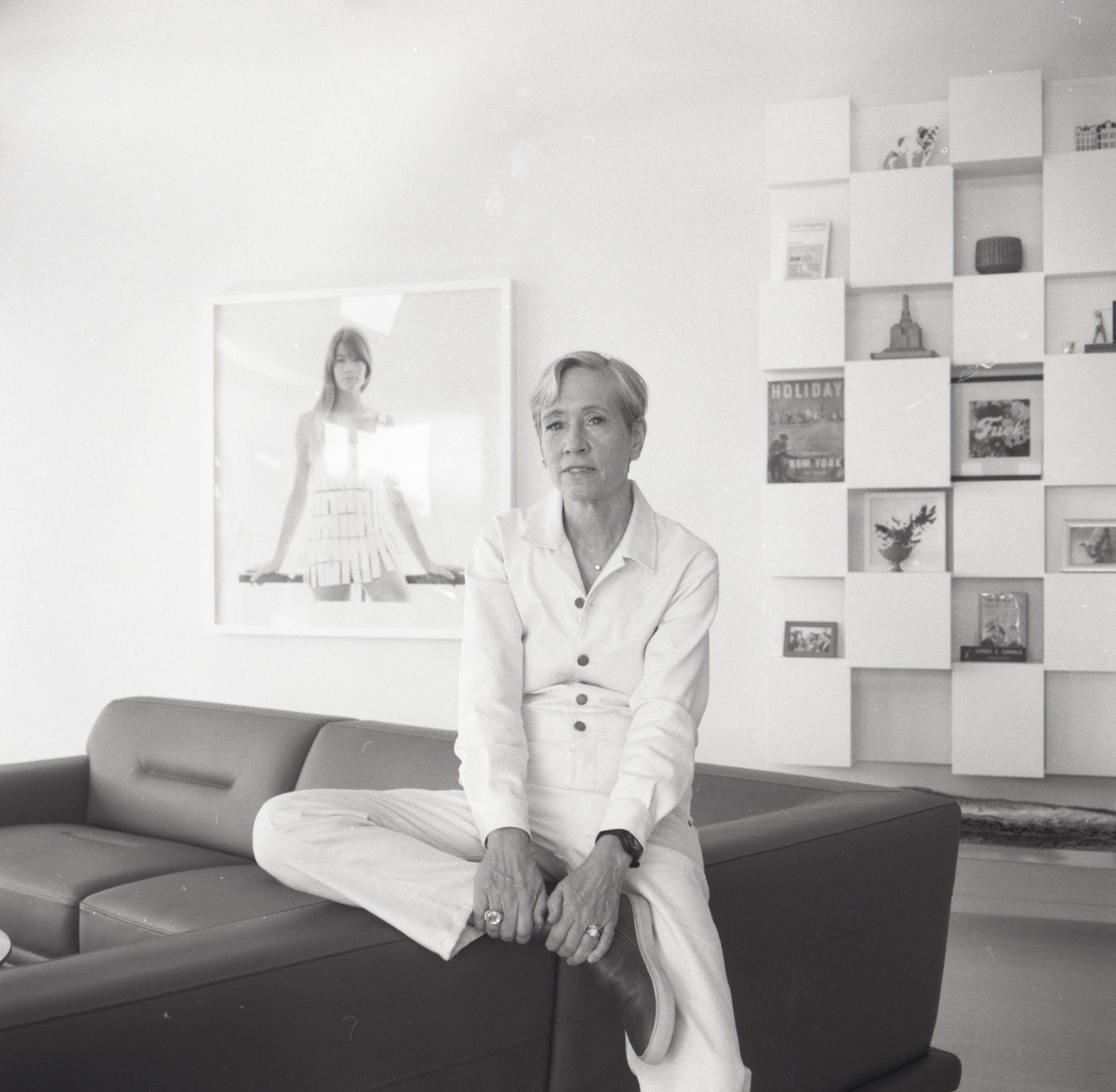
In her youth, Beers says acting, "was the only thing I thought I wanted to do."
From there, Beers spent several years working with Gale Anne Hurd (who’d produced The Terminator and Aliens, among other sci-fi megahits) followed by the English director Mike Newell, with whom she developed 2000’s High Fidelity. The first movie Beers considered her “baby” was 1999’s cult favorite 200 Cigarettes, a box office bomb with a truly bonkers cast (including but not limited to: Dave Chappelle, Kate Hudson, Paul Rudd, and Courtney Love) that is streaming nowhere and copies of which were, for a while, selling for $200 on eBay. Even in this early project, Beers sees the DNA of what was to come: A female-led creative team (200 Cigarettes’ director, writer, editor, production designer, and costume designer were all women) and an episodic nature that wasn’t quite right for a feature film. “I look back on that movie,” Beers says, “and there’s so much about it that was a television show.”
When Beers met Rhimes, neither woman had any experience in television. This was in 2002, when HBO, already home to The Sopranos and Sex and the City, bragged in its marketing about not being TV, and when the Golden Globes’ television nominees were assigned seats in the nosebleeds while movie stars glittered in the front rows. “I thought TV was amazing, [but] I closet-watched it because movie executives never talked about TV and it was embarrassing to talk about TV,” says Beers.
At the time, she was working with producer Mark Gordon, who by then had produced Speed and Saving Private Ryan and was interested in getting into television. Gordon set up the shidduch, introducing Beers to Rhimes, who has never been late to anything, save for this fortuitous meeting. Gordon commented on Rhimes’s tardiness, and “Betsy swore at him, if I remember correctly,” Rhimes tells me. “Betsy has a really great foul mouth.”
Rhimes said that she and Beers “talked non-stop” during their meeting. As Beers remembers it, “It was one of those things where you sit down with somebody and immediately you realize you're speaking the same language.”
“We were complete opposites,” Rhimes says. “Betsy is literally Mayflower, WASPy, East Coast blonde. I am Black, Midwestern [and] Southern roots, curvy. We just couldn't be more different. I don't know what it was, but we just got along like gangbusters.” She suspects their connection was accelerated by their shared distaste for small talk—what Rhimes called “that fake banter thing that people do”—and their relief at having found a comrade who was so willing to just… be. “I was definitely not a cool person,” Rhimes confesses. “[But] I was my very uncool self and didn't care, and she didn't care, and therefore I didn't feel self conscious.”
Being TV novices—Rhimes’s biggest screenwriting credits in the early aughts: The Princess Diaries 2: The Royal Engagement, the Britney Spears’ vehicle Crossroads—worked for and against them. Their first collaboration, a pilot about female war correspondents, went nowhere. Beers laughs now thinking of their naïveté, having never worked with a television budget. (“Dude, there were so many tanks.”) But Rhimes believes their blank-slate brains were ultimately what empowered them to think as expansively as they did, uninhibited by preconceived notions about the way things had always been done. “We literally just wanted to make shows about people we wanted to watch,” Rhimes says.
What ABC wanted was a medical show. Rhimes had always been interested in doctors; Beers, however, found medical dramas confusing. Rhimes told her about interns, ideal viewer surrogates who would be just as in over their heads as the rest of us, and Beers was sold. Rhimes wrote a pilot, which as Beers recalls was the last to be picked up to film and the last to be picked up to series “because I don’t think anybody really was sure that it was going to work.”
When Rhimes and Beers went into pitch meetings, Beers did all the talking; Rhimes would do the reading. As in, she would have a piece of paper and read off her prepared document. Rhimes does an imitation of this younger, petrified self, speaking as if she hoped she would be swallowed by the floor: “Meredith Grey is a surgeon. She has a hospital job. Blah, blah, blah, blah. I would read it like that. And if you interrupted me, I would have to start all over again at the beginning. It was bad.” Fortunately for Rhimes, Beers would swoop in and “tap dance,” Rhimes says, charming the room with promises about Rhimes’s transcendent talent and their duo's brilliant vision.
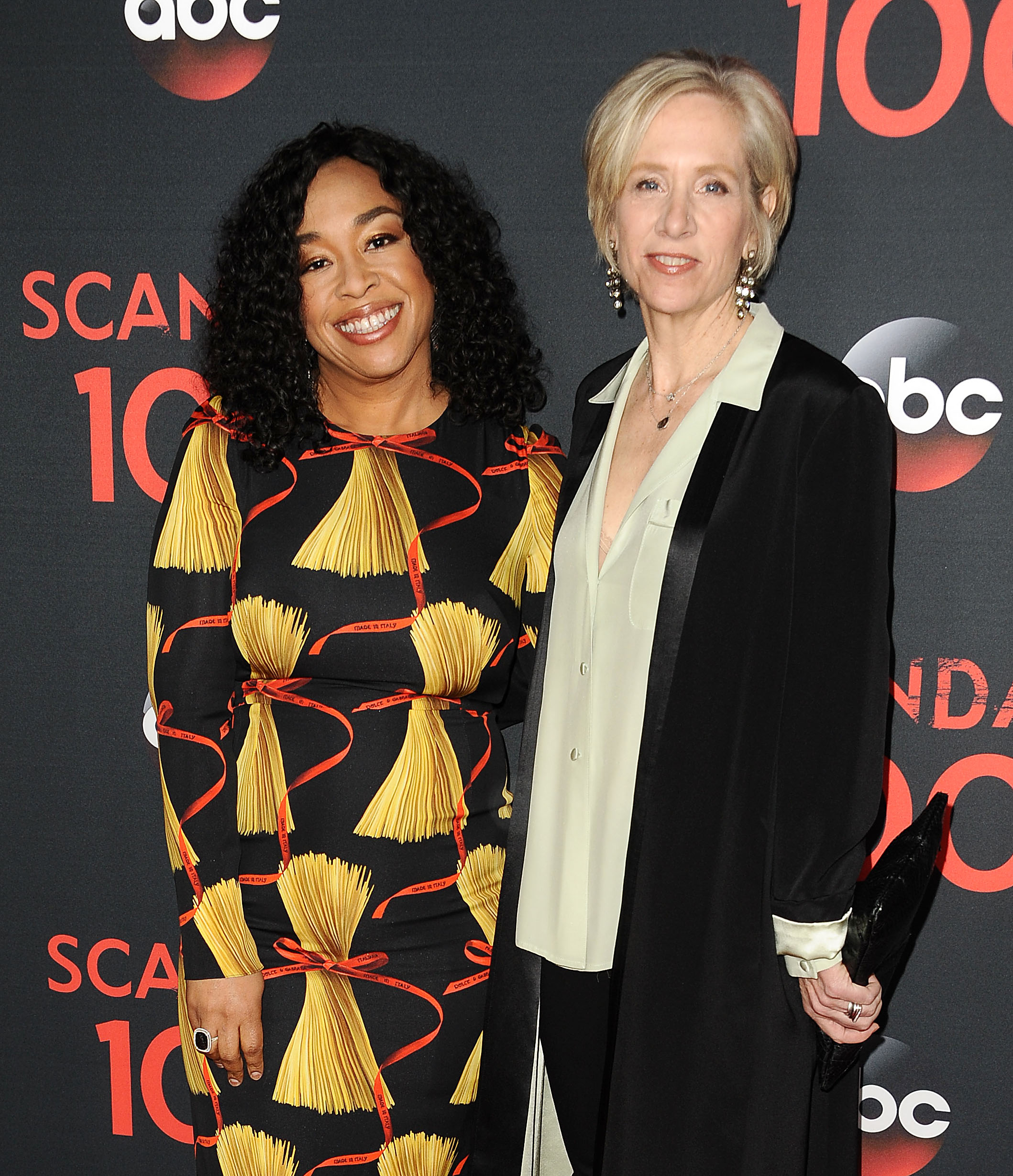
Rhimes (left) says of her first meeting with Beers, “It was one of those things where you sit down with somebody and immediately you realize you're speaking the same language.”
After they shot the Grey’s Anatomy pilot, Rhimes and Beers were summoned to a meeting with the top brass at ABC. “The Old White Men Room,” Rhimes says. “Everybody over the age of fifty-something.” These gents had screened the episode, and they had some notes. Specifically: They were appalled that Meredith would go out drinking (!) and have sex (!!) with a man she’d just met (!!!) the night before she started a new job (!!!!). What kind of harlot would ever do such a thing?
“They were basically bringing us in to say, ‘This show is not a show that any woman is going to want to watch, that is relatable to anybody. No woman behaves this way,’ ” says Rhimes. “They were basically saying to me, ‘You've written science fiction.’ ”
Rhimes was silent, too shocked and nervous to speak, when Beers piped in to offer this counterfactual: “I screwed somebody the night before my first day of work.”
“There are these moments where I can’t help myself,” Beers says now. “And I just felt incredibly strongly about the fact that they were just wrong. They were absolutely wrong. And nobody questioned anything after that.”
“Their faces just turned purple,” Rhimes says. “They couldn’t get out of the room fast enough. And I just remember thinking: thank you. Because I couldn’t figure it out: What do you say to people when they’re saying this? And Betsy’s like: You just tell them the truth.” It was the moment Rhimes knew she’d found, as her own characters would say, her person.
Though ABC executives didn’t have faith in the series, a friend of Beers’s in the ABC marketing department told her that assistants were swiping copies of the new episodes off their bosses’ desks. That fall, Beers left Mark Gordon Productions to work with Rhimes on Grey’s full-time. The show went on to be the longest-running scripted medical drama series in primetime history. At the Grey's season-three height, an average of 25 million people were tuning in each week. “It was a surreal experience,” Beers says.
Since then, she and Rhimes have had this surreal experience several times over. Grey’s was just renewed for its 19th season (while Beers remains an executive producer on the show, she has not been involved in the day-to-day of production since 2017). Grey’s spawned two spinoffs, Private Practice in 2007 and Station 19 in 2018. Scandal debuted in 2012, winning fans in high places (Michelle Obama binged it), earning a battery of accolades (including two Emmys and a Peabody award), and prompting a run on Olivia Pope’s favorite wine glass (sales quadrupled when the show took off, then quadrupled again when season two aired). How to Get Away with Murder, which premiered in 2014, made history when its star, Viola Davis, became the first Black woman to win the Emmy for Outstanding Lead Actress in a Drama Series. And in 2017, Rhimes inked a nine-figure deal with Netflix; last year, the deal expanded to include feature films, virtual reality, and gaming. As Shondaland’s Creative Partner, Beers also signed an overall deal with Netflix, the details of which she declined to disclose to Marie Claire.
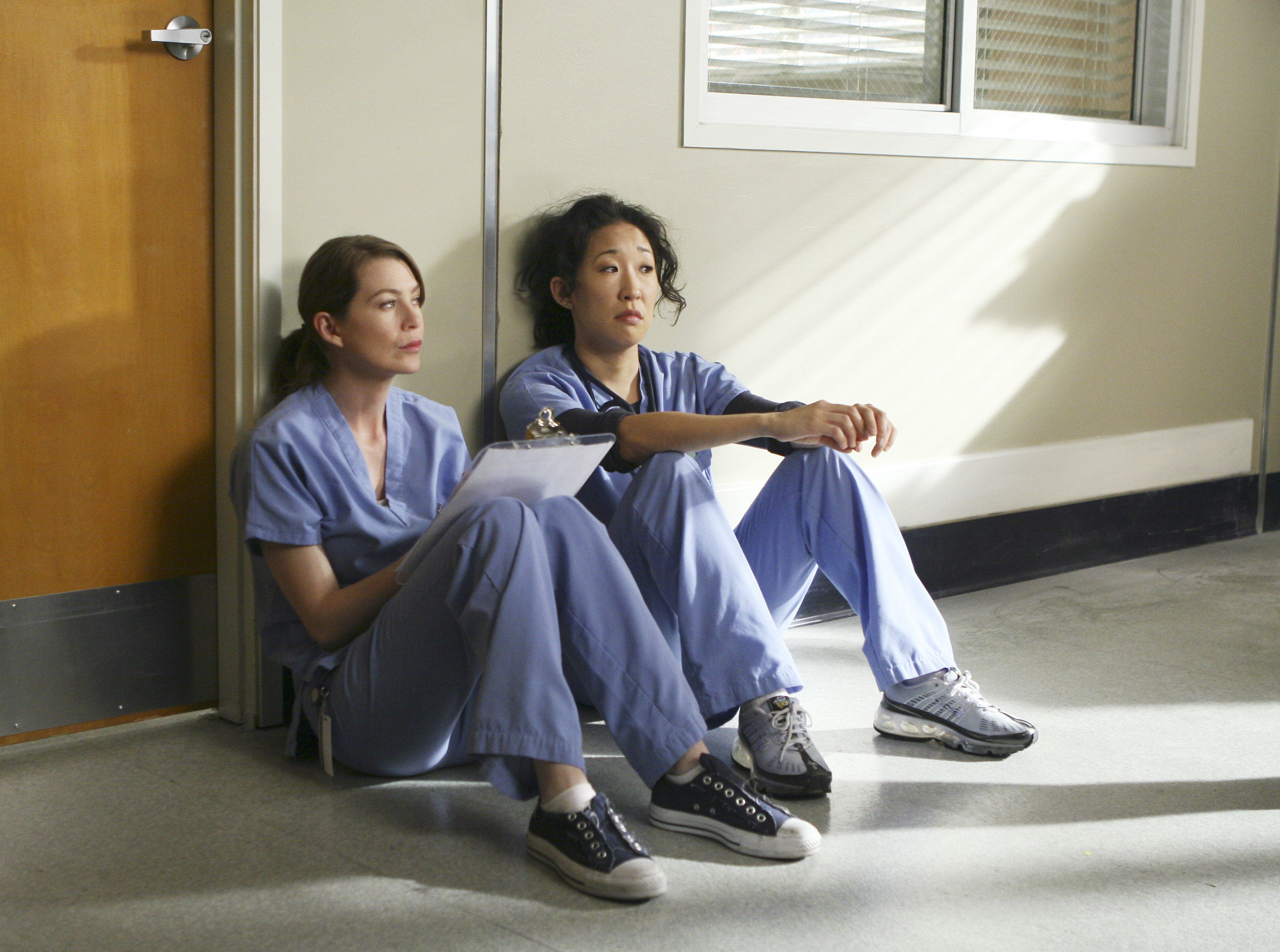
Meredith (Ellen Pompeo) and Christina (Sandra Oh) in a scene from season 3 of Grey's Anatomy. Beers calls the show's popularity, "a surreal experience."
Has Beers gotten used to it? “You learn a lot,” she says. “But it never ceases to be weird.”
Kate Walsh, an original Grey’s cast member and star of Private Practice, describes Beers as “a voice of reason” to whom she could always turn for counsel. “She’s a safe place. She was there for you. She could actually give you tactical advice on how to get through the day-to-day business of set life. We all took that strange, crazy ride together of that sudden, explosive fame and success… and with mass success, you get more and more protected, but you still have to be free and vulnerable to do all that we have to do, and she holds that space for us.”
“She’s always been sensible and reasonable and calm, which may sound basic,” Walsh adds. “But in Hollywood is not always the case.”
Nicola Coughlan, who plays Penelope Featherington on Bridgerton, remembers being “stressed the hell out” about scheduling conflicts between Bridgerton and Derry Girls, logistics that were made even more complicated by COVID-19 filming policies. “Betsy got on the phone with me and was like, ‘You are really important to us, we love Derry Girls, we’re going to work this out for you,’ ” Coughlan says—and they did. “She really put her money where her mouth is… It’s cool that someone who is such a name, in such a position of power, makes so much time for the actors she works with.”
In 2005, Rhimes launched her production company, Shondaland. Rhimes’s go-to line is that Beers is the “land” half of the equation, though it is a potentially sensitive situation. Beers is often unsung, her contributions swept up in the Shonda of it all. “I feel like people want to suggest that it's all Shonda all the time,” Rhimes says, but “that’s not how it works.”
In their decades of friendship, “We’ve come to terms with it,” says Rhimes. “It’s been hard for me. I think it’s been hard for her at times… [and] there have been frustrations for both of us… Because when something goes great, people say, ‘Oh, it's Shonda.’ When something goes horribly, people say, ‘Oh, it's Shonda.’ And that has its good and its bad. Betsy deserves applause. And, I think, in [the industry] that comes to her, but I don't think that the acclaim that she necessarily deserves everywhere shows up the way it should.”
The very first scene of Bridgerton is of Anthony having sex against a tree. In season two, it takes much, much longer for Anthony—or anyone—to do more than hold intense, lingering eye contact. Not to be that viewer. But I had to ask: Was it just me, or was this season a little light on the, you know, burning-for-you business?
Beers assures me that I’m far from the only person to have that reaction. “That’s a totally normal thing,” she says. “Trust me.”
Whether or not the slower burn of season two will disappoint fans “is certainly something we considered,” says Beers. “But I feel like there is no way to tell this story and front load.” Faced with the classic sophomore season challenge—how do you give the people what they want, but not exactly what they’ve already had?—Beers and the Bridgerton team knew they’d need to recalibrate, leading to some major book-to-screen changes. Beers believes it’ll land, that “lust and desire, in some ways, are as potent and essential and amazing to watch as fulfillment.”
Besides, Bridgerton isn’t about sex so much as it’s “about choosing what your heart wants and figuring out a way to navigate the terrain to create a life for yourself in which the most important thing is the love you feel for someone else and yourself,” Beers explains.
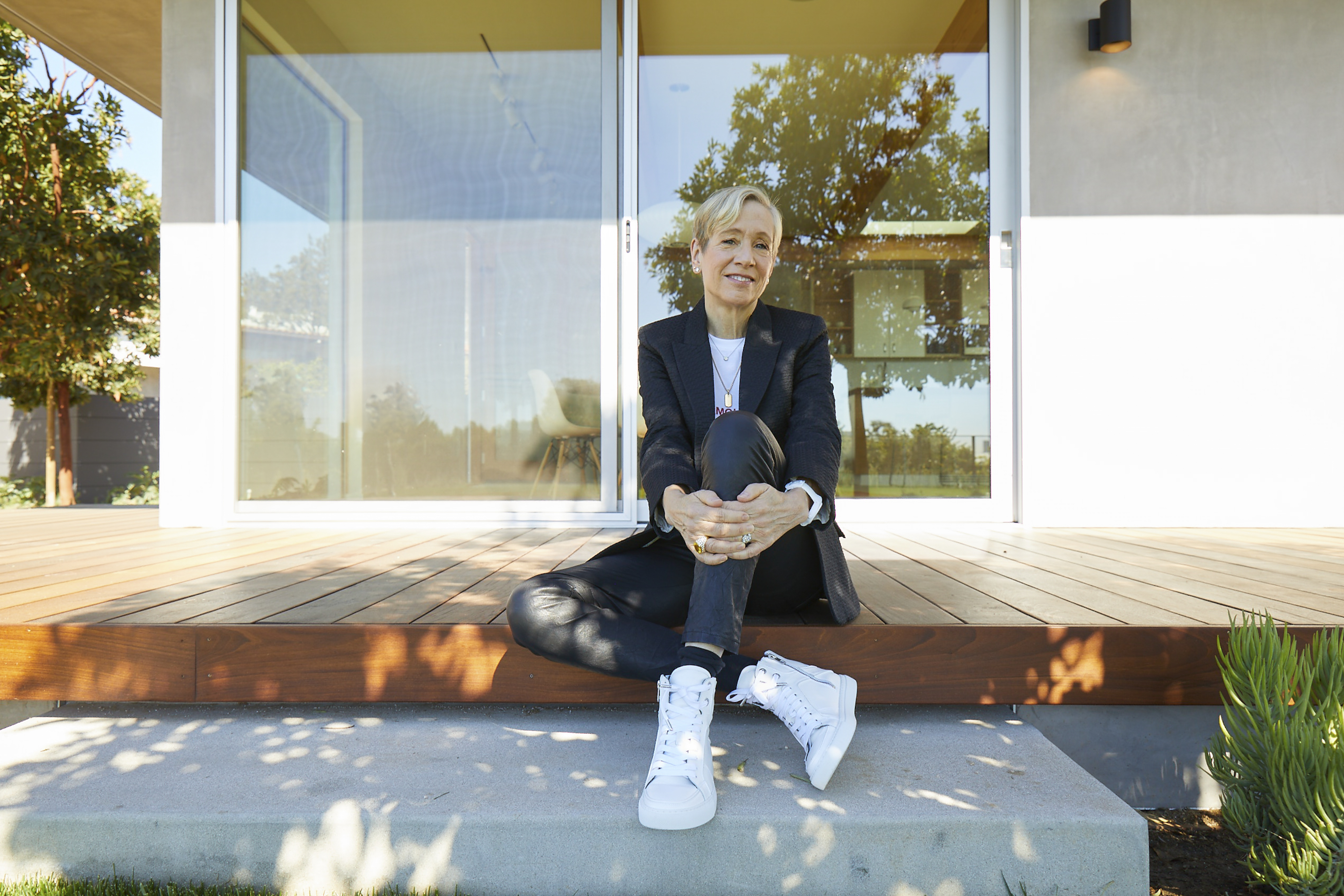
Up next for Beers: a 'Bridgerton' spinoff about Queen Charlotte.
Rhimes is the one who first brought the Bridgerton books to Beers’s attention, and Beers immediately saw the appeal. “It’s a damn franchise,” she says of the books, one her “television brain” could easily see slotting into seasons that worked as standalone stories and chapters of a “continuing saga of a family.”
But Beers has another barometer for what material makes for good TV, one that goes beyond those grounded observations to something a little more esoteric. She likes to ask herself, “What are people thinking about? What’s bothering them?” She spends a lot of time listening to friends and eavesdropping in restaurants and reading the news, looking for the constellation that connects all those disparate dots: “What does all this have in common? [I’m] trying to figure out what the themes are.”
So in the mid-2000s, when she sensed that society’s collective trust in authority was wavering and citizens were tempted to play judge, jury, and executioner, she and Rhimes developed Scandal and How to Get Away with Murder. With Bridgerton—though its development predates the pandemic—Beers picked up on audiences’ growing hunger for “a delicious escape,” she says. “I think there was clearly a sea change going on in the world… In the tumultuous times that we’re living in, there was something about going to this place that had rules.” In Bridgerton, “You follow the rules, or you transform the rules to fit your world.”
Speaking of transforming the world: Season three of Bridgerton will bring about significant behind-the-scenes change. Showrunner Chris Van Dusen left at the close of season two. He’s been replaced by longtime Shondaland staffer Jess Brownell, who has been on Bridgerton from the beginning, worked on Anna and Scandal, and started out ages ago as Beers’s assistant. The one moment when Beers, warm and effusive throughout our hours-long conversations, seems to cool was when I ask about Van Dusen’s departure, offering simply, “It was something he decided. But I think it’s great.” (Shondaland didn’t make Van Dusen available for comment.)
The Bridgerton cinematic universe is also expanding. A prequel/spinoff, Queen Charlotte, is in the works, which Rhimes will write and co-executive produce alongside Beers. So, for the first time in a while, they’ll actually be involved in the same project on the same timeline. What Beers wants now, poetically enough, is what she had at the very beginning: to work side-by-side with Rhimes. She thinks the “hardest times” in this journey, even when the shows “worked really well, and we had successes,” were when she and Rhimes had to divide and conquer in order for their television empire to thrive. “I always missed that process, that kind of day-to-day that we would have when we were deep in something together.”
Beers's job isn't one that would have occurred to her to seek out until she found it. She wonders how many would-be Betsys are out there, feeling out of place in improv groups and writers’ rooms, who could bloom as she did, on this path.
“I'm really proud of the job,” she says. “And I love the idea that, for people who might not want to be a writer and people who might not want to be an actor, there is a whole other world that you can be as creative and as active in being able to articulate the way you view the world, and get to make great work.”
Jessica M. Goldstein is a freelance writer covering all things culture. Her debut novel, RETRO, is coming out from Ballantine Books in 2026. You can read her in The New York Times, Vulture, McSweeney's Internet Tendency, and more.
